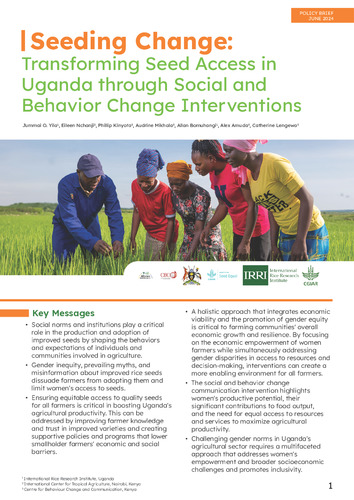Seeding change: transforming seed access in Uganda through social and behavior change interventions
Abstract
Social norms and institutions play a critical role in the production and adoption of improved seeds by shaping the behaviors and expectations of individuals and communities involved in agriculture. Gender inequity, prevailing myths, and misinformation about improved rice seeds dissuade farmers from adopting them and limit women's access to seeds. Ensuring equitable access to quality seeds for all farmers is critical in boosting Uganda's agricultural productivity. This can be addressed by improving farmer knowledge and trust in improved varieties and creating supportive policies and programs that lower smallholder farmers' economic and social barriers. A holistic approach that integrates economic viability and the promotion of gender equity is critical to farming communities' overall economic growth and resilience. By focusing on the economic empowerment of women farmers while simultaneously addressing gender disparities in access to resources and decision-making, interventions can create a more enabling environment for all farmers. The social and behavior change communication intervention highlights women's productive potential, their significant contributions to food output, and the need for equal access to resources and services to maximize agricultural productivity. Challenging gender norms in Uganda's agricultural sector requires a multifaceted approach that addresses women's empowerment and broader socioeconomic challenges and promotes inclusivity

